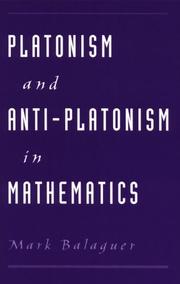| Listing 1 - 8 of 8 |
Sort by
|
Book
ISBN: 9780262525794 0262525798 0262321459 9781461957836 1461957834 9780262321457 9780262321464 0262321467 Year: 2014 Publisher: Cambridge, Massachusetts: MIT Press,
Abstract | Keywords | Export | Availability | Bookmark
 Loading...
Loading...Choose an application
- Reference Manager
- EndNote
- RefWorks (Direct export to RefWorks)
In our daily life, it really seems as though we have free will, that what we do from moment to moment is determined by conscious decisions that we freely make. You get up from the couch, you go for a walk, you eat chocolate ice cream. It seems that we're in control of actions like these; if we are, then we have free will. But in recent years, some have argued that free will is an illusion. The neuroscientist (and best-selling author) Sam Harris and the late Harvard psychologist Daniel Wegner, for example, claim that certain scientific findings disprove free will. In this engaging and accessible volume in the Essential Knowledge series, the philosopher Mark Balaguer examines the various arguments and experiments that have been cited to support the claim that human beings don't have free will. He finds them to be overstated and misguided. Balaguer discusses determinism, the view that every physical event is predetermined, or completely caused by prior events. He describes several philosophical and scientific arguments against free will, including one based on Benjamin Libet's famous neuroscientific experiments, which allegedly show that our conscious decisions are caused by neural events that occur before we choose. He considers various religious and philosophical views, including the philosophical pro-free-will view known as compatibilism. Balaguer concludes that the anti-free-will arguments put forward by philosophers, psychologists, and neuroscientists simply don't work. They don't provide any good reason to doubt the existence of free will. But, he cautions, this doesn't necessarily mean that we have free will. The question of whether we have free will remains an open one; we simply don't know enough about the brain to answer it definitively.
Philosophical anthropology --- Free will and determinism --- Free will and determinism. --- Philosophy --- Philosophy & Religion --- Ethics --- Compatibilism --- Determinism and free will --- Determinism and indeterminism --- Free agency --- Freedom and determinism --- Freedom of the will --- Indeterminism --- Liberty of the will --- Determinism (Philosophy) --- PHILOSOPHY/General --- PHYSICAL SCIENCES/General
Book
ISBN: 1282694243 9786612694240 0262258544 9780262258548 9780262013543 0262013541 9781282694248 0262266156 Year: 2010 Publisher: Cambridge, Mass. MIT Press
Abstract | Keywords | Export | Availability | Bookmark
 Loading...
Loading...Choose an application
- Reference Manager
- EndNote
- RefWorks (Direct export to RefWorks)
This work presents an argument that the problem of free will boils down to an open scientific question about the causal histories of certain kinds of neural events.
Free will and determinism. --- Ethics. --- Deontology --- Ethics, Primitive --- Ethology --- Moral philosophy --- Morality --- Morals --- Philosophy, Moral --- Science, Moral --- Compatibilism --- Determinism and free will --- Determinism and indeterminism --- Free agency --- Freedom and determinism --- Freedom of the will --- Indeterminism --- Liberty of the will --- Philosophy --- Values --- Determinism (Philosophy) --- PHILOSOPHY/General --- Free will and determinism

ISBN: 1280470836 9786610470839 0195352769 0585245673 9780585245676 0195143981 9780195143980 9780195122305 0195122305 9781280470837 0195122305 0197731333 0190284056 Year: 1998 Publisher: Oxford : Oxford university press,
Abstract | Keywords | Export | Availability | Bookmark
 Loading...
Loading...Choose an application
- Reference Manager
- EndNote
- RefWorks (Direct export to RefWorks)
Demonstrating that there are no good arguments for or against mathematical Platonism, the author establishes that both Platonism and anti-Platonism are defensible views by solving the important problems associated with each of these views.
Mathematics --- Platonists. --- Platonism --- Philosophers --- Philosophy, Ancient --- Logic of mathematics --- Mathematics, Logic of --- Philosophy. --- Platonists --- Philosophy --- Mathematics - Philosophy
Book
ISBN: 1009346008 1009346040 1009346032 1009346016 9781009346009 9781009346047 9781009346030 Year: 2022 Publisher: Cambridge : Cambridge University Press,
Abstract | Keywords | Export | Availability | Bookmark
 Loading...
Loading...Choose an application
- Reference Manager
- EndNote
- RefWorks (Direct export to RefWorks)
This Element defends mathematical anti-realism against an underappreciated problem with that view-a problem having to do with modal truthmaking. Part I develops mathematical anti-realism, it defends that view against a number of well-known objections, and it raises a less widely discussed objection to anti-realism-an objection based on the fact that (a) mathematical anti-realists need to commit to the truth of certain kinds of modal claims, and (b) it's not clear that the truth of these modal claims is compatible with mathematical anti-realism. Part II considers various strategies that anti-realists might pursue in trying to solve this modal-truth problem with their view, it argues that there's only one viable view that anti-realists can endorse in order to solve the modal-truth problem, and it argues that the view in question-which is here called modal nothingism-is true.
Mathematics --- Anti-realism. --- Modality (Logic) --- Philosophy. --- Modal logic --- Logic --- Nonclassical mathematical logic --- Bisimulation --- Antirealism --- Philosophy --- Logic of mathematics --- Mathematics, Logic of
Book
ISBN: 9781009346030 9781009346016 Year: 2022 Publisher: Cambridge Cambridge University Press
Abstract | Keywords | Export | Availability | Bookmark
 Loading...
Loading...Choose an application
- Reference Manager
- EndNote
- RefWorks (Direct export to RefWorks)
Book

ISBN: 9783111386294 Year: 2024 Publisher: Berlin Boston
Abstract | Keywords | Export | Availability | Bookmark
 Loading...
Loading...Choose an application
- Reference Manager
- EndNote
- RefWorks (Direct export to RefWorks)
Book

ISBN: 9781400873371 Year: 2016 Publisher: Princeton, NJ
Abstract | Keywords | Export | Availability | Bookmark
 Loading...
Loading...Choose an application
- Reference Manager
- EndNote
- RefWorks (Direct export to RefWorks)
Multi

ISBN: 9781400873371 9780691169651 Year: 2016 Publisher: Princeton, N.J. Princeton University Press
Abstract | Keywords | Export | Availability | Bookmark
 Loading...
Loading...Choose an application
- Reference Manager
- EndNote
- RefWorks (Direct export to RefWorks)
| Listing 1 - 8 of 8 |
Sort by
|

 Search
Search Feedback
Feedback About UniCat
About UniCat  Help
Help News
News